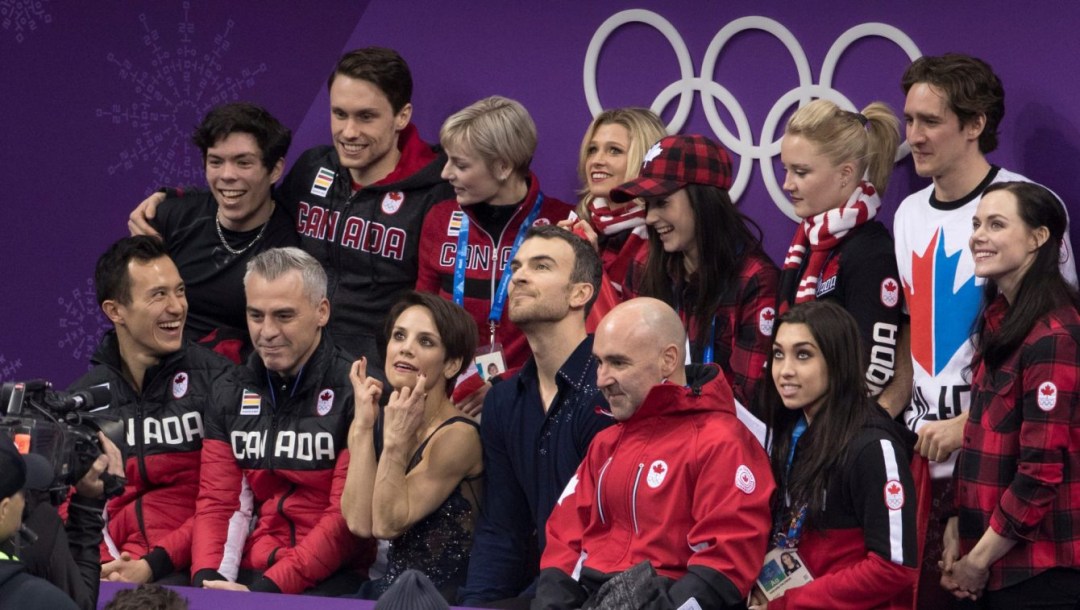Team Canada in first after first day of Olympic figure skating team event
The short program performances by Meagan Duhamel and Eric Radford in the pairs and Patrick Chan in the men’s singles have put Team Canada in first place after the first day of the figure skating team event at PyeongChang 2018.
Two-time world champions Duhamel and Radford scored 76.57 points with a very solid skate. They had slight deductions in the grade of execution for the landings on their side-by-side triple Lutzes but were extremely happy with their pairs elements, such as the twist, the lift and their death spiral.
“That was a good skate,” said Duhamel. “That was one of our higher scores. Anything between 75 and 80 is a really high score for us so we’re happy with that.”

Team Canada’s Eric Radford and Meagan Duhamel compete in the pairs short program, team event at the 2018 Olympic Winter Games in PyeongChang, Korea, Thursday, February 1, 2018. COC Photo by Jason Ransom
That put them in second place behind Olympic Athletes from Russia (OAR) Evgenia Tarasova and Vladimir Morozov, who scored 80.92. Germans Aliona Savchenko and Bruno Massot placed third in the pairs short program with 75.36 points while Americans Alexa Scimeca Knierim and Chris Knierim were fourth with 69.75 points.
In the team event, skaters are awarded points based on their placements.
The 9 points Duhamel and Radford received for their second-place finish were added to the 8 points Chan got for his third-place finish earlier in the day. With 17 total, the Canadians have a three-point lead on the United States. Japan, bolstered by a first-place finish from Shoma Uno in the men’s short program, and the OAR both have 13 points.
Skating first in the second flight of 10 men, three-time world champion Chan fell on his opening quad toe. He then doubled the planned triple toe on the backend of his triple Lutz combo and fell on his triple Axel. His score of 81.66 points was well short of his personal best 102.13.

Team Canada’s Patrick Chan competes in the men’s short program in the team event at the 2018 Olympic Winter Games in PyeongChang, Korea, Thursday, February 1, 2018. COC Photo by Jason Ransom
But luck was on Team Canada’s side.
One of the pre-Games favourites, 18-year-old American Nathan Chen, could only do a double toe on the backend of his opening quad flip and then doubled his planned quad toe before falling on his triple Axel. He ended up just behind Chan with 80.61 points.
With the door open for him to give OAR an early lead, Mikhail Kolyada fell on both of his opening jumps, a quad Lutz and a quad toe, and then popped his triple Axel into a single. He ended up in eighth place with 74.36 points.
“It’s interesting when this sort of thing happens, there must be a common denominator. I think the only difference than usual is the early morning competition, not to say it’s a bad thing or I’m mad about it,” Chan said of the 10:00 am local start time for the men’s short programs. “For me, even though it’s my third Olympics, it still feels like the early jitters of the Olympics and competing for the first time.”

Team Canada’s Patrick Chan competes in the men’s short program of the team event at the 2018 Olympic Winter Games in PyeongChang, Korea, Thursday, February 1, 2018. COC Photo by Jason Ransom
Canada had been the top-ranked team to qualify for the Olympic team event, based on performances from the 2017 World Championships as well as the Grand Prix series this past fall. Russia and the United States had qualified second and third and are expected to be Canada’s biggest challengers for the gold medal.
Despite his jump issues, any disappointment Chan felt didn’t last long once he saw the smiles of his teammates in the kiss and cry.
“Normally if it’s just me, by myself, I would start analyzing it and being disappointed in the skate but they were all so supportive,” he said. “No need to apologize to them or anything and I think that’s the greatness of the team event. You always have to remember this isn’t about me. This is about all of us. Each discipline can support each other even if some of us have mistakes or bad days.”

Teammates cheer on Meagan Duhamel and Eric Radford of Canada who perform in the pair short program in the team event at the 2018 Olympic Winter Games in PyeongChang, South Korea, Friday, Feb. 9, 2018. (AP Photo/David J. Phillip)
On Sunday, the women and ice dancers will compete in their short programs while the pairs will compete in the free skate. The medals will be awarded on Monday after the men, women and dancers compete in their free skates. Only the top five teams after the short programs will qualify through to the free skates.
Canada won silver when the team event made its Olympic debut at Sochi 2014. Russia claimed the gold there while the United States took bronze.


